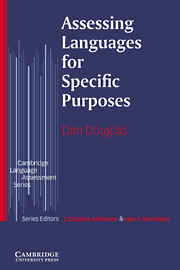Book contents
- Frontmatter
- Contents
- Series editors' preface
- Acknowledgements
- 1 Why test language for specific purposes?
- 2 Specific purpose language ability
- 3 Context, discourse domains, and task characteristics
- 4 Strategic competence: between knowledge and context
- 5 From target language use to test tasks
- 6 Specific purpose tests of listening and speaking
- 7 Specific purpose tests of reading and writing
- 8 LSP test development and technology
- Appendix: other LSP tests
- References
- Index
1 - Why test language for specific purposes?
Published online by Cambridge University Press: 03 May 2010
- Frontmatter
- Contents
- Series editors' preface
- Acknowledgements
- 1 Why test language for specific purposes?
- 2 Specific purpose language ability
- 3 Context, discourse domains, and task characteristics
- 4 Strategic competence: between knowledge and context
- 5 From target language use to test tasks
- 6 Specific purpose tests of listening and speaking
- 7 Specific purpose tests of reading and writing
- 8 LSP test development and technology
- Appendix: other LSP tests
- References
- Index
Summary
Introduction
Testing language for specific purposes (LSP) refers to that branch of language testing in which the test content and test methods are derived from an analysis of a specific language use situation, such as Spanish for Business, Japanese for Tour Guides, Italian for Language Teachers, or English for Air Traffic Control. LSP tests are usually contrasted with general purpose language tests, in which purpose is more broadly defined, as in the Test of English as a Foreign Language {TOEFL) (Educational Testing Service 1965). As you will see, it is important to note that tests are not either general purpose or specific purpose – all tests are developed for some purpose – but that there is a continuum of specificity from very general to very specific, and a given test may fall at any point on the continuum. I will argue later in this chapter that LSP testing is a special case of communicative language testing, since both are based on a theoretical construct of contextualized communicative language ability, and that LSP tests are no different in terms of the qualities of good testing practice from other types of language tests.
Information
- Type
- Chapter
- Information
- Assessing Languages for Specific Purposes , pp. 1 - 23Publisher: Cambridge University PressPrint publication year: 1999
Accessibility standard: Unknown
- 1
- Cited by
